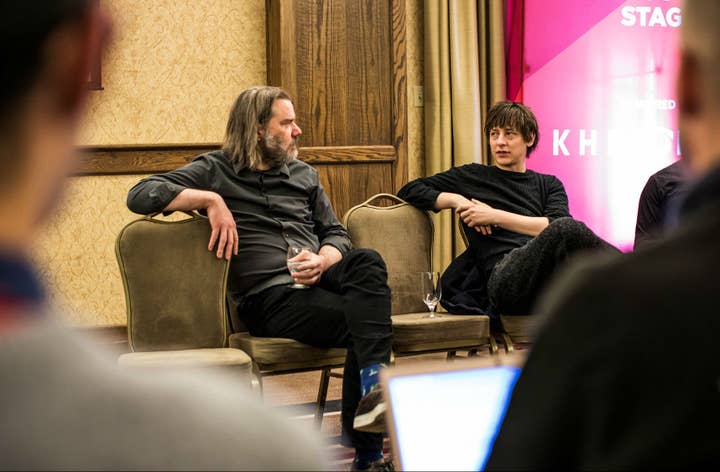VR would be "a really dark space right now" without Facebook's money
At Reboot Develop Red, Chet Faliszek reflected on progress in the VR industry since he departed Valve
Virtual reality would be "a dark space" if it wasn't for the financial support of Facebook, according to Stray Bombay co-founder Chet Faliszek, who was once an ambassador for Valve's push into the emerging VR space.
Faliszek was speaking as part of a broader panel on technology at Reboot Develop Red last month, also featuring Coherence CEO Dino Patti and Klang Games CEO Mundi Vondi. Patti raised the issue of technology companies funding game development, a subject on which Faliszek had a great deal to say.
"It's happening a lot, especially in the VR space," he said. "People aren't making money because they're selling their games. They're making money because they're paid to make the games, to support platforms or pieces of hardware.
"There's a bunch of AR stuff that's like that now, and in VR... There's a bunch of places where that's happening, and there's a lot of indies starting up and making that their business model. But that's kinda like the '90s, when all the publishers took off, and there was a hiccup. It was death to a million small indies."
"A lot of indies are being set up to go from hand-to-mouth, never earning past what they get paid to make that game"
Faliszek is now running a new studio, Stray Bombay, with Kimberly Voll, but he spent many years at Valve, largely contributing as a writer to franchises like Half-Life, Left 4 Dead and Portal. Towards the end of his time at the company, though, he was arguably the most public-facing figure in its activities around SteamVR and HTC Vive.
During that period, both Valve and Oculus VR (which is owned by Facebook) invested in third-party development, with the latter often tying those funds to timed exclusivity deals. Over time, however, Facebook has emerged as the bigger investor, publicly committing $500 million to the creation of VR content.
"It's a worry that I have right now; that a lot of indies are being set up to go from hand-to-mouth, never earning past what they get paid to make that game," Faliszek continued. "So if I was an indie -- which I am -- I would look at building a community, and something longer [term] outside of that ecosystem."
While Faliszek made it clear that VR was not the only space in which this was happening right now, it was the only example he discussed in any detail. Patti responded that his own views on the subject have shifted, from a time when he believed that tech companies didn't "respect the natural evolution that happens in games, and [they] kind of force it in, in terms of tech, in a direction."

"But I changed my opinion about it -- because we're lucky, the position that we're in and the history that we've had," Patti said. "But a lot of indies maybe need to do their first game before they can be trusted to develop something [else].
"So even though they're getting paid for a game... maybe it does enough for them to raise [funding] or get a publisher, because they've made a name for themselves. It's also kickstarting an industry."
While funding from a company like Oculus might help a new developer improve its standing, though, Faliszek responded that it has a different effect on the market as a whole.
"In VR, in particular, it became this weird situation where it inflated the market," he said. "And it inflated then what people thought they had to spend to make a game, which then created a situation where you could only make the game if you were getting that money."
"VR devs have to always be looking forward and asking, 'What happens if this stops tomorrow? What do we do?'"
There have been exceptions to this trend, with Faliszek pointing to Beat Saber as one of several. He also conceded that, whatever impact or distorting effects it had on the market, Facebook's financial commitment has been "helpful" to VR overall -- but developers must still be honest with themselves about what would be left if it ever disappeared.
"VR would be a really dark space right now if that wasn't happening," he said. "It's just that those devs have to always be looking forward and asking, 'What happens if this stops tomorrow? What do we do?' And I don't think there's a lot of good answers for that right now for them.
"Y'know, except, 'make good games.' And that's one of the things with VR -- you have a lot of people who've never run a game studio or made games, and this is their opportunity. It would drive me nuts -- like, 'Have you ever read a game design book? Have you ever watched a video from GDC?'
"I think there was some weeding out of that that was probably helpful. Some companies should close. That's the nature of our industry, right? But having it [done] by an outside force is the thing that worries me."
While Facebook continues to pour money into VR development, Faliszek's former employer, Valve, recently made a significant announcement. Half-Life: Alyx will not only be the first game in the revered franchise since Half-Life 2: Episode Two in 2007, it will also be the company's "flagship VR" title.
This is an apparent attempt by Valve at creating a killer app for virtual reality -- a game that won't just sell to everyone in the existing market, but will drive more people to buy the hardware necessary to play it at all. More information will be revealed today at 10am PT / 6pm GMT.
Whether Half-Life: Alyx can deliver a burst of organic growth for the whole of VR is an open question, but it is unlikely to create the kind of sustainable environment that Faliszek said the industry lacks. It is notable, of course, that after years of being deeply involved with VR at Valve, Faliszek has not dabbled in the space since he departed.
"I think a lot of people thought I was going to go and make something in VR," he said. "And I still like VR, but that doesn't make a sustainable company right now in my eyes. It all has to be about either investment or getting paid to make stuff, and I didn't think that's... I don't want to live like that. I wanted something that was a bit more long-term, and then that would allow us to venture into other things.
"You see that with Insomniac. They make Spider-Man, but then they make VR stuff on the side. Spider-Man is paying the bills, right? That's a cool way to do it."
GamesIndustry.biz is a media partner of Reboot Develop Red. We attended the show with assistance from the organiser.









